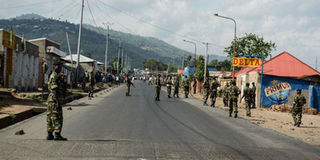Looking again at the failed coup against Nkurunziza, it tells us a lot

Soldiers patrol during a demonstration in the Musaga neighborhood of Bujumbura on May 18, 2015. AFP PHOTO | JENNIFER HUXTA
What you need to know:
- Twelve countries — Burundi, Burkina Faso, Cameroon, Chad, Gabon, Guinea, Namibia, Niger, Togo, Uganda, Algeria, and Djibouti — have all seen presidential term-limits changed, scrapped altogether, or had the Big Man still stand for elections ignoring what the constitution says.
- Then Rwanda president Juvenal Habyarimana was alleged to have bribed corrupt officers in Uganda’s intelligence services to spy on the Rwandan exiles and refugees, so much so that had they not launched their return-to-the-homeland campaign quickly, they would have been too infiltrated to do it later.
Burundi’s president Pierre Nkurunziza last week survived a coup by the skin of his teeth, all because of his third term power grab.
Presidential term limits are under attack in Africa and in recent years, only three countries in Africa have seen presidents try and fail to remove term limits — Nigeria, under Olusegun Obasanjo, Zambia under Frederick Chiluba, and Malawi under Bakili Muluzi.
Twelve countries — Burundi, Burkina Faso, Cameroon, Chad, Gabon, Guinea, Namibia, Niger, Togo, Uganda, Algeria, and Djibouti — have all seen presidential term-limits changed, scrapped altogether, or had the Big Man still stand for elections ignoring what the constitution says.
It is probably time to stand back and ask why, beyond the usual greed for power, we are having this anti-term limit wave.
First, we need to ask why term limits were never an issue in Africa until the mid-1990s. The reason for that was that we had term limits, but they came by way of military coups, presidential assassinations, or presidential natural death.
The general stability that Africa started witnessing from the late 1980s, and the decline of coups, actually dramatically increased presidential longevity — and so we started noticing that leaders were around forever and began writing term limits into constitutions.
Otherwise, what happened to Nkurunziza last week was the principal way term limits were exercised in Africa in the past.
However, there has been another change we have not fully appreciated. If you go to universities in France, Britain, and the US, you will find quite a few of the elderly African professors there were former ministers or senior bureaucrats who fled in the late 1970s and the 1980s after the president who appointed them was deposed, or they fell out with him and he went for their necks.
There were a lot of opportunities in the West for former African politicians. And in Africa, when Ghana’s Kwame Nkrumah was kicked out in a coup, his friend, Guinean dictator Ahmed Sekou Toure, gave him asylum and made him co-president! Something like that simply cannot happen in Africa today.
When general Idi Amin overthrew Milton Obote in Uganda in 1971, his comrade, Tanzania’s Julius Nyerere, told him: “My brother, come live next door to me, I will take care of you,” or words to that effect. Obote lived next door to the Nyerere State House in Dar es Salaam, and Mwalimu ensured that he was fed.
By contrast, by the early 1980s when now-President Yoweri Museveni was fighting his bush war, crooked fellows in Kenya were grabbing Ugandan exiles in Nairobi and selling them to the government in Kampala.
Also, one fact that is not much known outside Rwanda and Uganda is that the timing of the Rwanda Patriotic Army (RPA) attack (from Uganda) in October 1990 was partly due to the same factors.
Then Rwanda president Juvenal Habyarimana was alleged to have bribed corrupt officers in Uganda’s intelligence services to spy on the Rwandan exiles and refugees, so much so that had they not launched their return-to-the-homeland campaign quickly, they would have been too infiltrated to do it later.
So, first, opportunities for former politicians and presidents have shrunk — they are mostly useless to most after they lose office these days. In the past, they were highly prized.
An American university no longer needs to hire a former African Finance minister if it wants someone with knowledge of an African economy. It can hire the more qualified African with a PhD in economics who was the last World Bank head in an African country.
Even a former African president might fail to get a job driving a cab in New York. So, unless their pensions are generous, they are rich, or have stolen enough while in office, they can actually go hungry when they lose power or leave the job.
Thus because of the way the world has changed, the shift in the kind of African the world has room for, and the complex way in which democracy and corruption have come together to limit the ability of president’s to do what Toure did with Nkrumah, things are very tight for our former presidents.
All the fine arguments about lifting term limits, therefore, mask one reality. Most African presidents today are actually stranded in State Houses. Most have nowhere else to go or anything else better to do.
The author is editor of Mail & Guardian Africa. Twitter@cobbo3





